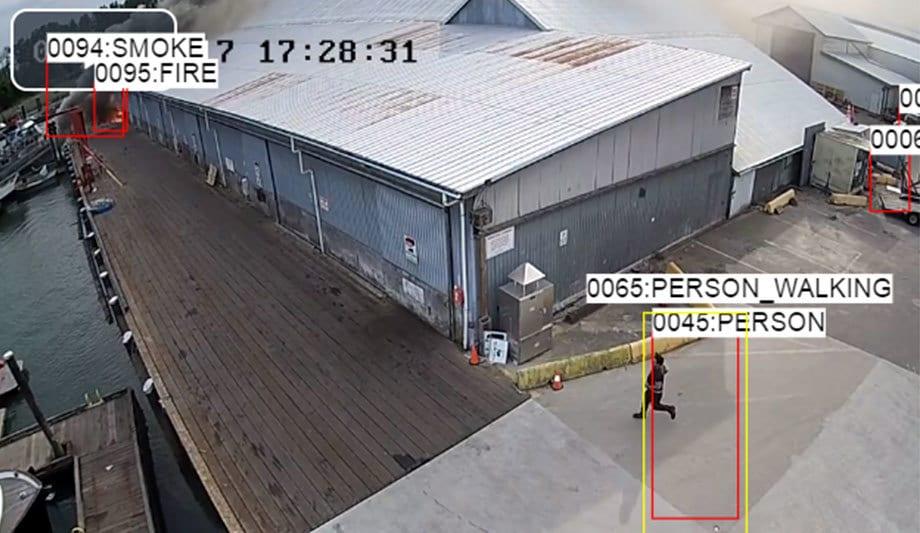There’s no doubt about it: the video analytics sector is exploding right now. With the AI-powered video analytics market set to reach $4.5 billion by 2025, clearly, video AI companies are in high demand.
But what do you know about them?
In this article, we’re going to break down our top five video AI companies we think you should know about. This includes a quick overview of the company, and how its work is impacting the modern world.
Ready? Let’s dive in!
GoodVision
Overview
GoodVision is a Czech-based startup that’s overhauling the transportation industry to make it much more efficient & productive.
How does it do this? By capturing traffic data from high-power surveillance cameras and proprietary AI. Then, it visualizes the data on their interactive and easy-to-understand user interface.

Background
The startup was founded in 2017 by founders Lukas Hruby and Daniel Stofan. Both individuals had spotted a glaring issue with data collection in relation to traffic and transportation:
Traffic data collection was not only resource-intensive but also incredibly time-consuming.
This meant that large-scale businesses were making crucial development decisions based on potentially-inaccurate data. As a result, this severely hinders the progress of making transportation more efficient.
The first couple of years were spent conducting extensive research into video-analytical systems. Before long, they’d taken everything they’d learned and combined it with high-quality AI technology.
The result was their flagship product, GoodVision Video Insights. It’s used on roads and junctions, capturing and visualizing rich data in an easy-to-understand manner. The conclusion is? Congestion is decreased, traffic control aided, and improving the safety of road travel.
The product is offered on a pay-as-you-go model, making it even more attractive to potential users.
Future Plans
Looking to the future, GoodVision is eager to continue consolidating its place in the fast-growing traffic management industry.
Outside of road traffic, the startup is also breaking into indoor traffic. This includes retail analytics, mall layout optimization, and opening hours optimization.
Agent VI
Overview
As video AI companies go, Agent VI (Agent Video Intelligence) is a true success story.
It serves as the leading global supplier of AI-powered video-analytics solutions, with no signs of slowing down.
The company’s flagship product, innoVi, uses AI-powered surveillance cameras to automatically detect and analyze points of interest. This helps to improve the safety, security, and efficiency of both businesses and public areas.
The product not only detects events of interest in real-time but also extracts data from masses of video footage. It then presents it on a map-based user workflow.
This allows organizations to capture huge volumes of data in an effective way and quickly implement it to improve both safety and efficiency.
Background
The startup was founded in 2003 by Zvika Ashani and Itsik Kattan who have since grown it to monumental status.
In fact, they were the first software startup to commercially deploy products using deep learning algorithms. This has firmly set the standard for video-analytics solutions.
The startup has since obtained successful deployments across several industries, including law enforcement, education, retail, hospitality, and city surveillance.
Future Plans
In recent years, the startup has been driven to cement video surveillance at the heart of public safety & efficiency.
Having started out with simple on-premise installations, they’ve since expanded to cloud-based solutions. This enables any camera, from any geographical region, to remotely connect to agent VI’s software. This is set to continue its meteoric growth over the next few years.
Viisights
Overview
Here’s a major roadblock with video-analytics solutions:
Certain points of interest are hard for an algorithm to differentiate between. For example, someone falling over due to clumsiness and someone slipping due to a safety hazard.
That’s where Viisights comes in.
Their software allows businesses to automatically detect and differentiate human behaviors, before converting them into actionable data.
The software is based on holistic and temporal video streaming analysis, meaning video clips rather than standalone images. It extracts physical features of humans, such as their positioning, movement, and relationship with others. It’s then used to differentiate between harmless events (such as a hug) and potentially-dangerous events (such as a fight).
Although available for on-premise installation, the software can be deployed via the cloud. This allows the startup tremendous room to scale, and cement itself as a leader in behavioral recognition technology.
Background
The startup was founded in 2014 by a small group of serial entrepreneurs. They’d recognized a growing demand for more-intelligent video AI companies. After thoroughly researching the industry, they realized the potential of smart video understanding technology. They then vowed to develop fully-autonomous AI technologies based on human-like video understanding.
Future Plans
In November 2019, the startup announced a $10M round of Series A funding by Canadian Venture Capital firm Awz Ventures. The startup has wasted no time in putting the funding to use. With ambitious plans to enhance its current product range, they’re looking to develop new solutions and establish a global presence.
Recently the startup has enabled organizations to get to work safely during the COVID-19 pandemic. This is all whilst using its solution to recognize violations of social distancing within businesses.
Ultinous
Overview
As we’ve already established: behavioral-orientated video AI companies are exploding in the public safety & efficiency sectors.
However, Hungarian startup Ultinous realized that the same technology could also significantly improve the profitability of businesses.
The startup’s software uses cutting-edge AI technology to develop behavioral-orientated video analytics solutions. It has the intention of optimizing businesses for profitability.
It achieves this by learning shopper patterns and shortening queues through its queue prediction tool. This helps to reduce the number of excessively-long queues and increase conversion rates.
Retailers can also count both passer-by traffic and footfall, identifying both returning customers and known offenders. The solution also tracks ROI, promotional area statistics, and dwell times. This data is then presented in an easily-accessible manner through a web-based customer portal or dataops.
Background
Since being founded in 2014, the company has grown to become active in Europe, the US and the Middle East. They’ve established a strong team of in-house engineers, as well as a dedicated research group for deep learning.
Over six years, the startup has expanded from the retail market to sports stadiums, airports, concerts and governmental facilities. Although known for increasing profitability, the startup has branched into flow management, in order to broaden its market share.
Future Plans
Following the COVID-19 pandemic, the startup has also worked in conjunction with security tech firm Bi3. This venture has been to monitor and enforce social distancing measures in the retail sector.
Gameface
Overview
When it comes to AI, it’s easy to conjure up an image of a tunnel-visioned entrepreneur, set on making their idea work by any means necessary…
However, some of the most successful and innovative projects are born out of trial and error.
Gameface is a video-analytics AI program that analyses sports games such as cricket and soccer. It provides rich in-game analysis to help coaches plan and adjust game tactics.
The technology collates data on objects, movements and specific people to allow coaches to best adapt their teams’ strategies. This is not only far more accurate than manual tracking, but also far more time-efficient.
However, the story of how it came to be is an interesting one….
Background
The startup was originally founded under the name Flixsense in 2015, with the aim of providing context around celebrities in movies and TV shows.
Flixsenses’ two founders spend countless hours building a face-recognition platform. When watching a TV show or movie from a smartphone, users could tap on an actors’ face to pull up data about them, including their biography, filmography and interesting facts.
However, the platform never made it past a few hundred users.
The team decided to try and re-market the product to the sporting world, but quickly made a stark realization:
The biggest problem faced by sports teams was the need to manually tag events, which was time-inefficient and drew away from being able to actually analyse the game.
Wanting to fill the gap, the startup rebranded as Gameface and re-worked the product collate and present analytical data on sports games.
Future Plans
Since then, the startup has continued to go from strength to strength. In September 2020, they announced a round of Venture Capital funding from St. Louis-based firm Stadia Ventures, which is also coaching the startup through a 14-week business development accelerator program.







